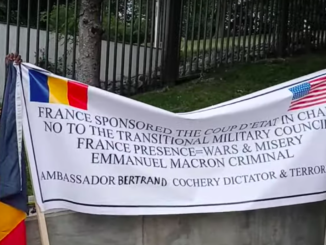African Stream produced this video report: “The United States Africa Command—or AFRICOM—was founded in 2007. But it’s failed to bring peace and security. Major failures in Somalia, Libya and elsewhere have left many Africans suspecting it exists only to serve U.S. interests.”
Related Articles
Related Articles
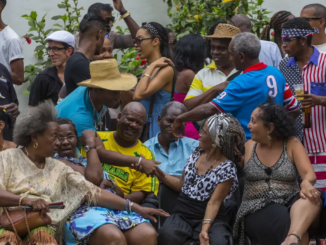
‘Anti-Black’ Claim Raised About Cuba As Solidarity Activists Stopped at U.S. Border & Black Socialists Arraigned in United States for Collaborating with Russia
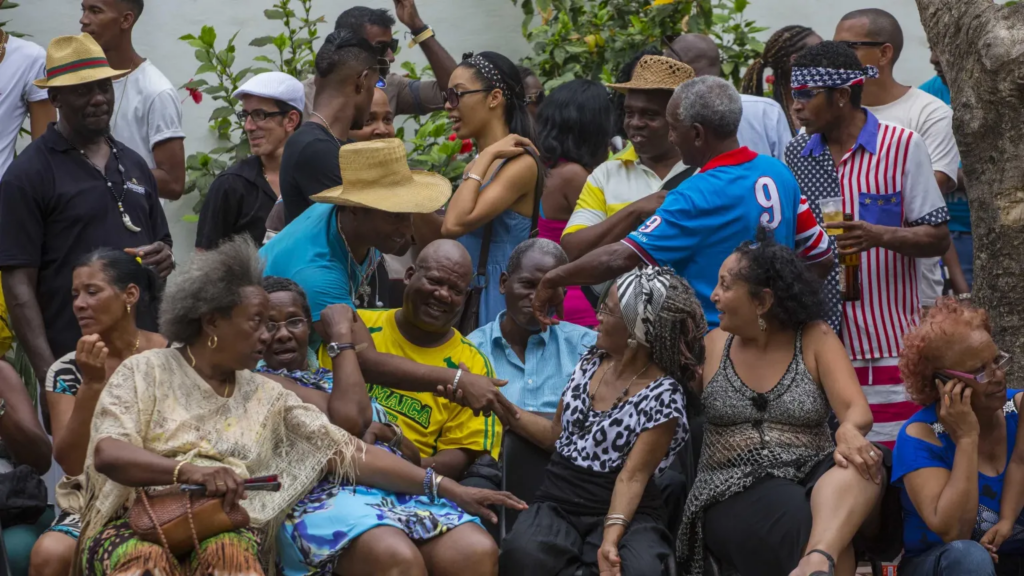
A 2-year-old argument about “anti-Blackness” in Cuba, which Black solidarity activists in the United States say has no basis in reality, has reared its head.
It appeared in a video posted on Twitter on May 1 that has since gone viral, generating more than 2 million views in four days. The video features Afro-Cuban Grecia Ordoñez, who claims Cuban Revolution leaders Fidel Castro and Ernesto “Che” Guevara were racists who engaged in “white saviorism.” She also claimed genocide was committed in the Democratic Republic of Congo during the time Cuba’s revolutionary government intervened to support rebels fighting the DRC government put in place after revolutionary leader and first Prime Minister Patrice Lumumba was assassinated in 1961. Further, she pointed to Afro-Cubans being detained in Cuba as an example of racism.
A message to black Americans from Cubans regarding Che Guevara and Fidel Castro. #Cuba🇨🇺 pic.twitter.com/kHCDnBaE6H
— Martha Bueno (@BuenoForMiami) May 1, 2023
Activists debunked her claims on Twitter, including a thread of articles and videos featuring members of anti-imperialist group Black Alliance for Peace.
For 2 years, the “anti-Blackness” claim has allowed "human rights" narratives to form around revolutionary states in the crosshairs of the U.S. empire. This video comes on the heels of one of the largest U.S. youth delegations to visit #Cuba (@PeoplesForumNYC). Here's a thread 🧵 https://t.co/oV3AhE9V0u
— Black Alliance for Peace (@Blacks4Peace) May 4, 2023
The thread included the following articles and videos:
- Hood Communist Guide to the U.S. Blockade
- Limits of Lived Experience by Erica Caines
- Out of The Clouds: Remarks on Anti- Blackness In Cuba by Salifu Mack
- Witnessing Afro Cubans and Social Change by Austin Cole
- An African Palenque: Cuba And Global Black Solidarity by Kimberly Monroe
- African Power and Politics In Cuba’s La Marina Neighborhood by Musa Springer
- Ajamu Baraka on Cuban Protests
- Afro-Cubans Against Cuba
- Black Alliance For Peace x Belly of The Beast Screening Event
- James Early and Musa Springer on Cuba, Socialism and Race
- Black August and The Cuban Revolution
While Ordoñez doesn’t point to evidence for the claim about genocide in Congo, a 2021 article in the Journal of Cold War Studies states:
“In reality, the main purpose was to crush the rebellion and secure Western interests in Congo. The intervention reflected a cavalier attitude toward sovereignty, international law, and the use of force in postcolonial Africa and had the adverse effect of discrediting humanitarian reasoning as a basis for military intervention until the end of the Cold War. The massacre of tens of thousands of Congolese in Stanleyville was a unique moment in which African countries united in their criticism of Western policies and demanded firmer sovereignty in the postcolonial world.”
Black Activists Reject Claims of Cuba’s Racism
The Black Alliance for Peace released a statement close to two years ago after protests erupted in Cuba over claims of racism. The statement, titled, “Biden’s Commitment to U.S. White Power Is the Real Race Issue in Cuba,” concludes, “We say to all those who pretend to be concerned about Cuba to demand an end to the embargo and to respect the right of the Cuban people to work through their own problems. As the first republic established on the basis of race and subsequently invented apartheid, the United States should be the last on the planet to lecture anyone on race relations.”
Activists like Asantewaa Nkrumah-Ture raised her voice against the claim that Cuba holds Black political prisoners.
“Who are ‘Black political prisoners’ in Cuba? What are their names? What organizations do they belong to & are those organizations independent of [U.S. National Endowment for Democracy] NED and [U.S. Agency for International Development] u.s. AID? Do they belong to [movement of jailed dissidents] Ladies in White? LOL, you sound more & more like Carlos Moore,” Nkrumah-Ture tweeted. Moore is an Afro-Cuban academic who wrote a 1988 book criticizing Cuban leader Fidel Castro as using racist means to grow Cuba’s influence around the world.
Who are "Black political prisoners" in Cuba? What are their names? What organizations do they belong to & are those organizations independent of NED and u.s. AID? Do they belong to Ladies in White? LOL, you sound more & more like Carlos Moore 🇨🇺
— Mawusi Ture (@MawusiTure) May 4, 2023
Further, activist and Ph.D. candidate Kimberly Miller tweeted in reply, “Are the ‘Black political prisoners’ you’re referring to leaders of San Isidro ‘movement,’ like Luis Alcántara or Denis Solís, who admittedly had members ‘who love Trump’ and directly met w/charge d’affaires at U.S. Embassy in Havana to foment regime change??”
are the “Black political prisoners” you’re referring to leaders of San Isidro ‘movement’ like Luis Alcántara or Denis Solís who admittedly had members “who love Trump” and directly met w/chargé de affaires at US Embassy in Havana to foment regime change?? https://t.co/NUpR919H9X
— Kimberly-Dawn 🇸🇩 (@ComradeKimDawn) May 5, 2023
U.S. Solidarity Activists Detained After Visit to Cuba
Meanwhile, Ordoñez’s viral video came just as the largest solidarity delegation in recent history commemorated May Day or International Workers’ Day, alongside 100,000 Havana residents representing many sectors of work. Last year’s parade drew 700,000 Cubans in Havana, as well as thousands of people who celebrated across the island. However, this year, the more-than-60-year-old U.S. blockade on Cuba has caused fuel shortages that required Cuba to cancel the parade itself and instead organize events in Havana’s neighborhoods, as Musa Springer reported on Radio Sputnik’s “By Any Means Necessary,” co-hosted by TF Board Secretary Jacqueline Luqman.
“Cubans say they are in a second Special Period,” Springer said, referring to the first Special Period that occurred after the Soviet Union dissolved in 1991, thereby causing drastic shortages of food, fuel and machinery in the 1990s. Cuba’s gross domestic product thus dropped by 35 percent in three years.
More than 1,000 foreigners from 58 countries, all representing 271 youth, labor, social and political organizations traveled into Cuba this year for the parade, as well as for an annual conference held the next day. The delegation, led by People’s Forum in New York City, included between 300 and 350 U.S.-based activists, including many young people who had never been to Cuba before. The People’s Forum tweeted that their delegation faced a second questioning behind closed doors upon their return to U.S. airports and that their digital devices had been confiscated for searches.
Upon arrival to U.S. airports, U.S. citizens and non-citizens usually line up at booths to be questioned by U.S. Customs and Border Patrol officers. Most people are allowed to continue into the United States after answering a few questions about the reason for their journey abroad. Any reason can provoke a second questioning in private, which can extend a traveler’s time inside the airport by hours.
Activist Bill Hackwell wrote in Resumen Latinoamerica English that both members of the International Peoples Assembly delegation and the LA US Hands Off Cuba Committee delegation faced a second round of interrogations, as well as device confiscations. At the time of his writing, members in those delegations had been freed.
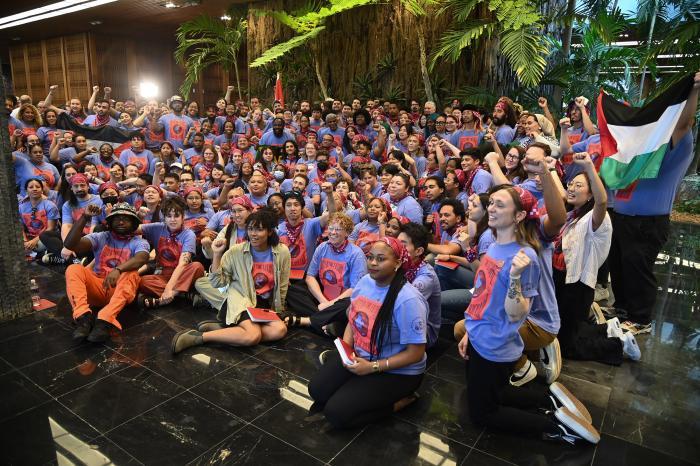
Hackwell commented on the irony by remarking on his experience in Cuba.
“What I have seen this past week is a government here more concerned about the well-being of the next generation of U.S. youth than their own government that marginalizes them by constricting access to jobs with a living wage, that makes access to education nearly impossible without the burden of student loans that they will carry for years, and that incarcerates them at a rate like no other country in the world.”
Manolo De Los Santos, executive director of the People’s Forum, thanked the Cuban people for their solidarity.
“These unfortunate incidents are further evidence of the wrong direction of a hostile U.S. foreign policy towards Cuba,” De Los Santos concluded in the tweet. “Their actions in fact demonstrate that the U.S. is far from a bastion of democracy and human rights, and rather than intimidate us, they motivate us to strengthen our struggles for true, transformative change here in the United States.”
🇨🇺✊🏽 After hours of harassment & interrogation, all the comrades who traveled to Cuba are FREE! Thanks for all the love & solidarity received from throughout the world!!
The aggressive attitude of the Customs & Border Patrol officials towards the members of our delegation during…
— Manolo De Los Santos (@manolo_realengo) May 4, 2023
Cuban President Miguel Díaz-Canel Bermúdez expressed his solidarity with the detained activists.
“Cheer up guys, we’re with you. Thank you for your courage, for supporting #Cuba and for facing the hatred of those who cannot stand the fact that the Cuban Revolution has the support of the most progressive youth in the very bowels of the beast. We send you a big hug.”
Ánimo, muchachos, estamos con ustedes. Gracias por la valentía, por apoyar a #Cuba y por enfrentar en las propias entrañas del monstruo el odio de quienes no pueden soportar que la Revolución Cubana tenga el apoyo de los jóvenes más progresistas. Les mandamos un fuerte abrazo. https://t.co/N6K2H92CaX
— Miguel Díaz-Canel Bermúdez (@DiazCanelB) May 4, 2023
U.S. Government Attacks Black Socialists
Meanwhile, the Hands Off Uhuru campaign announced via email to the press that on Tuesday, May 2, African People’s Socialist Party Chairman Omali Yeshitela and African People’s Solidarity Committee Chairwoman Penny Hess appeared in federal court in Tampa, Florida, in response to the U.S. Dept. of Justice’s April 18 indictment. The Black socialist group is accused of allegedly attempting to “sow discord” in the United States with the support of Russia.
Yeshitela, an 81-year-old Black man, and Hess, a white woman active in the movement since 1976, were “booked, restrained with handcuffs and leg irons, and held in a cell for several hours before appearing before a judge who released them on conditional bond that included a requirement to hand over their passports.
On Monday, May 8, Uhuru Solidarity Movement Chair Jesse Nevel will appear in response to the same indictment.
The group has asked the public to donate to the “Hands Off Uhuru! Hands Off Africa! Defense Fund” to help cover their legal fees.
Background information about this indictment can be found in a recent Toward Freedom article. If found guilty, the accused face up to 15 years in prison.
Julie Varughese is editor of Toward Freedom.
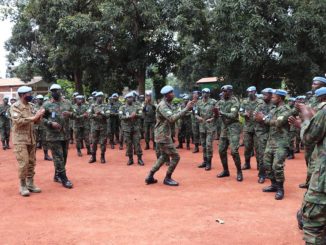
Rwanda’s Military Is the French Proxy on African Soil
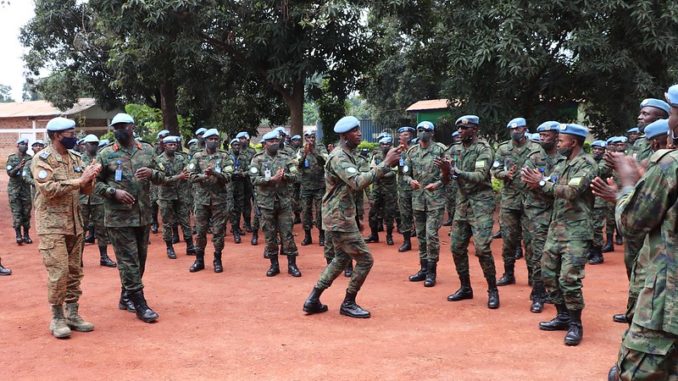
On July 9, the government of Rwanda said that it had deployed 1,000 troops to Mozambique to battle al-Shabaab fighters, who had seized the northern province of Cabo Delgado. A month later, on August 8, Rwandan troops captured the port city of Mocímboa da Praia, where just off the coast sits a massive natural gas concession held by French energy company TotalEnergies SE and U.S. energy company ExxonMobil. These new developments in the region led to the African Development Bank’s President M. Akinwumi Adesina announcing on August 27 that TotalEnergies SE will restart the Cabo Delgado liquefied natural gas project by the end of 2022.
Militants from al-Shabaab (or ISIS-Mozambique, as the U.S. State Department prefers to call it) did not fight to the last man; they disappeared across the border into Tanzania or into their villages in the hinterland. The energy companies will, meanwhile, soon start to recoup their investments and profit handsomely, thanks in large part to the Rwandan military intervention.
Why did Rwanda intervene in Mozambique in July 2021 to defend, essentially, two major energy companies? The answer lies in a very peculiar set of events that took place in the months before the troops left Kigali, the capital city of Rwanda.
Billions Stuck Underwater
Al-Shabaab fighters first made their appearance in Cabo Delgado in October 2017. For three years, the group played a cat-and-mouse game with Mozambique’s army before taking control of Mocímboa da Praia in August 2020. At no point did it seem possible for Mozambique’s army to thwart al-Shabaab and allow TotalEnergies SE and ExxonMobil to restart operations in the Rovuma Basin, off the coast of northern Mozambique, where a massive natural gas field was discovered in February 2010.
The Mozambican Ministry of Interior had hired a range of mercenaries such as Dyck Advisory Group (South Africa), Frontier Services Group (Hong Kong), and the Wagner Group (Russia). In late August 2020, TotalEnergies SE and the government of Mozambique signed an agreement to create a joint security force to defend the company’s investments against al-Shabaab. None of these armed groups succeeded. The investments were stuck underwater.
At this point, Mozambique’s President Filipe Nyusi indicated, as I was told by a source in Maputo, that TotalEnergies SE might ask the French government to send a detachment to assist in securing the area. This discussion went on into 2021. On January 18, 2021, French Defense Minister Florence Parly and her counterpart in Portugal, João Gomes Cravinho, talked on the phone, during which—it is suggested in Maputo—they discussed the possibility of a Western intervention in Cabo Delgado. On that day, TotalEnergies SE CEO Patrick Pouyanné met with President Nyusi and his ministers of defense (Jaime Bessa Neto) and interior (Amade Miquidade) to discuss the joint “action plan to strengthen security of the area.” Nothing came of it. The French government was not interested in a direct intervention.
A senior official in Maputo told me that it is strongly believed in Mozambique that French President Emmanuel Macron suggested the Rwandan force, rather than French forces, be deployed to secure Cabo Delgado. Indeed, Rwanda’s armies—highly trained, well-armed by the Western countries, and given impunity to act outside the bounds of international law—have proved their mettle in the interventions carried out in South Sudan and the Central African Republic.
What Kagame Got for the Intervention
Paul Kagame has ruled Rwanda since 1994, first as vice president and minister of defense and then since 2000 as the president. Under Kagame, democratic norms have been flouted within Rwanda, while Rwandan troops have operated ruthlessly in the Democratic Republic of the Congo. A 2010 UN Mapping Project report on serious human rights violations in the Democratic Republic of the Congo showed that the Rwandan troops killed “hundreds of thousands if not millions” of Congolese civilians and Rwandan refugees between 1993 and 2003. Kagame rejected the UN report, suggesting that this “double genocide” theory denied the Rwandan genocide of 1994. He has wanted the French to accept responsibility for the genocide of 1994 and has hoped that the international community will ignore the massacres in the eastern Congo.
On March 26, 2021, historian Vincent Duclert submitted a 992-page report on France’s role in the Rwandan genocide. The report makes it clear that France should accept—as Médecins Sans Frontières put it—“overwhelming responsibility” for the genocide. But the report does not say that the French state was complicit in the violence. Duclert traveled to Kigali on April 9 to deliver the report in person to Kagame, who said that the report’s publication “marks an important step toward a common understanding of what took place.”
On April 19, the Rwandan government released a report that it had commissioned from the U.S. law firm Levy Firestone Muse. This report’s title says it all: “A Foreseeable Genocide: The Role of the French Government in Connection with the Genocide Against the Tutsi in Rwanda.” The French did not deny the strong words in this document, which argues that France armed the génocidaires and then hastened to protect them from international scrutiny. Macron, who has been loath to accept France’s brutality in the Algerian liberation war, did not dispute Kagame’s version of history. This was a price he was willing to pay.
What France Wants
On April 28, 2021, Mozambique’s President Nyusi visited Kagame in Rwanda. Nyusi told Mozambique’s news broadcasters that he had come to learn about Rwanda’s interventions in the Central African Republic and to ascertain Rwanda’s willingness to assist Mozambique in Cabo Delgado.
On May 18, Macron hosted a summit in Paris, “seeking to boost financing in Africa amid the COVID-19 pandemic,” which was attended by several heads of government, including Kagame and Nyusi, the president of the African Union (Moussa Faki Mahamat), the president of the African Development Bank (Akinwumi Adesina), the president of the West African Development Bank (Serge Ekué), and the managing director of the International Monetary Fund (Kristalina Georgieva). Exit from “financial asphyxiation” was at the top of the agenda, although in private meetings there were discussions about Rwandan intervention in Mozambique.
A week later, Macron left for a visit to Rwanda and South Africa, spending two days (May 26 and 27) in Kigali. He repeated the broad findings of the Duclert report, brought along 100,000 COVID-19 vaccines to Rwanda (where only around 4 percent of the population had received the first dose by the time of his visit), and spent time in private talking to Kagame. On May 28, alongside South Africa’s President Cyril Ramaphosa, Macron talked about Mozambique, saying that France was prepared to “take part in operations on the maritime side,” but would otherwise defer to the Southern African Development Community (SADC) and to other regional powers. He did not mention Rwanda specifically.
Rwanda entered Mozambique in July, followed by SADC forces, which included South African troops. France got what it wanted: Its energy giant can now recoup its investment.
This article was produced by Globetrotter.
Vijay Prashad is an Indian historian, editor and journalist. He is a writing fellow and chief correspondent at Globetrotter. He is the director of Tricontinental: Institute for Social Research. He is a senior non-resident fellow at Chongyang Institute for Financial Studies, Renmin University of China. He has written more than 20 books, including The Darker Nations and The Poorer Nations. His latest book is Washington Bullets, with an introduction by Evo Morales Ayma.
